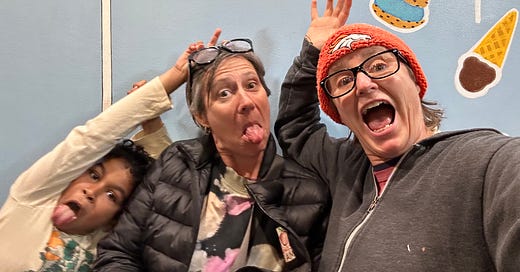Richard Young (Tom Hanks) and his wife, Kate, played brilliantly by Robin Wright, find themselves, as many of us do, reflecting on the past, examining choices, and questioning what it means to have truly lived. Directed by Robert Zemeckis and joined by the Forrest Gump crew, Here isn’t a typical nostalgia-driven drama or a tale about technology aging a character through decades. It’s a movie about what we remember—and what we regret.
Watching Here, I didn’t see a film just about a family home or time passing; I saw a powerful narrative about the quiet dreams that slip away while we’re busy trying to “play it safe.” The moments that linger for Richard and Kate aren’t the carefully planned ones—they’re the messy, loud, and spontaneous. The simple memories: Thanksgiving dinners, Christmas mornings, the chaos of raising children. And, yes, those memories come with their regrets, which ring out with a truth so sharp, it cuts.
Take the scene near the end, when Richard finally acknowledges the years he’s spent avoiding risk. “I should have bought us that house. We should have traveled.” His regret isn’t for the things he did that were reckless or ill-advised—it’s for the things he didn’t do. The dreams he shelved. He had lived so cautiously that he missed what it meant to live at all.
Another moment that stabs at the heart of this message comes from a different family who occupied the same house years earlier. The husband, a pilot with a passion for flying, bought himself a small plane and would take his daughter up with him, reveling in the freedom and thrill of the skies. His wife’s worry was relentless. She berated him, not only because of the perceived danger but because she saw his joy as foolish and selfish. When he dies, we’re left to wonder if it was a crash that claimed his life. But it wasn’t. The mundane influenza took him in the end—not his flying, not his love of the skies. The thing she feared didn’t take his life; life itself did.
This is where Here transcends nostalgia and offers something profound, even radical. It suggests that living safely, avoiding risks, and staying within the lines doesn’t make us any safer. All it does is rob us of the moments that make a life vibrant. It’s not foolishness that harms us—it’s the boxes we build around ourselves, the dreams we bury, the “what ifs” we lock away for someday.
I walked away from Here not thinking about the CGI aging effects or the beautiful cinematography. I thought about the sound of a drum played too loud, a plane flying too close to the sun, the laughter at family gatherings, and the dreams we’re told are foolish but that, in the end, are the ones that matter. For Richard, and for so many of us, it’s in staying foolish, in daring to do the things that scare us a little, that we find ourselves. Life isn’t about careful steps to the grave; it’s about the reckless abandon that makes those steps worthwhile.
In a world that rewards caution, let Here be your reminder: Stay foolish. Chase the dream, even if it’s loud or messy. In the end, it might be the one thing you don’t regret.






This sounds like the makers of this film knew something about the outcome of the election and are showing those who tried to play it safe what they might later regret in form of a film.